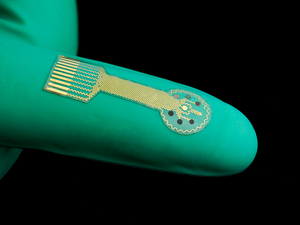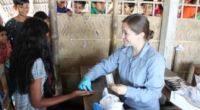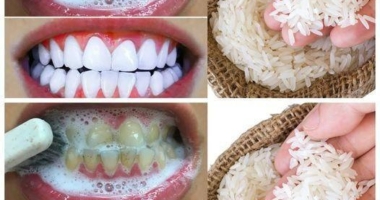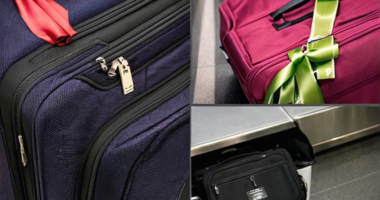Caltech researchers have developed a revolutionary solution for chronic wounds that won’t heal on their own. These smart bandages, designed by Wei Gao’s lab, consist of a stretchy polymer embedded with electronics and medication that monitor inflammation and gather medical data. These bandages can transmit wound data to electronic devices, deliver medication directly to the wound site, and stimulate tissue growth to promote faster healing. While the proof of concept was shown in small animal models, researchers aim to increase the device’s stability and test it on larger chronic wounds. The paper was published in the March 24 issue of the journal Science Advances. The research was funded by several institutions, including the National Institutes of Health, the National Science Foundation, and the Heritage Medical Research Institute.
Smart Bandages: A Revolutionary Solution for Chronic Wounds
Caltech researchers have developed an innovative solution to help diabetic patients dealing with chronic wounds that won’t heal on their own. These wounds not only affect patients’ lives but also create a significant financial burden on healthcare systems, amounting to $25 billion per year in the United States alone.
The smart bandages, designed by Wei Gao’s lab, are made of a stretchy polymer embedded with electronics and medication. These bandages monitor inflammation and gather medical data by detecting molecules such as uric acid or lactate and changes in pH levels or temperature in the wound that indicate bacterial infection or inflammation.
The bandage has three main functions. Firstly, it wirelessly transmits wound data to nearby electronic devices, such as smartphones or tablets, allowing for real-time monitoring by medical professionals or patients. Secondly, the bandage delivers medication, such as antibiotics, directly to the wound site to treat infection and inflammation. Thirdly, it can apply low-level electrical stimulation to the wound, promoting faster tissue growth and healing.
Under laboratory conditions with animal models, smart bandages have shown remarkable results, providing real-time updates about wound conditions and metabolic states, and promoting faster healing of chronic infected wounds.
Gao notes that more research is required to further improve the bandage technology and test it on human patients whose therapeutic needs may differ from those of animals. Nonetheless, the development of smart bandages represents a major breakthrough in chronic wound treatment, making it more effective, cost-efficient, and easier for both patients and medical professionals.
Smart Bandages: A Promising Solution for Chronic Wounds
Caltech researchers have developed a stretchable wireless wearable bioelectronic system for multiplexed monitoring and combination treatment of infected chronic wounds. While the proof of concept was shown in small animal models, researchers aim to increase the device’s stability and test it on larger chronic wounds.
The paper, titled “A stretchable wireless wearable bioelectronic system for multiplexed monitoring and combination treatment of infected chronic wounds,” was published in the March 24 issue of the journal Science Advances. The co-authors include postdoctoral scholar research associates in medical engineering Ehsan Shirzaei Sani and Yu Song, as well as other researchers from Caltech and Keck School of Medicine of USC.
The research was funded by several institutions, including the National Institutes of Health, the National Science Foundation, and the Heritage Medical Research Institute.
Don’t miss interesting posts on Famousbio









